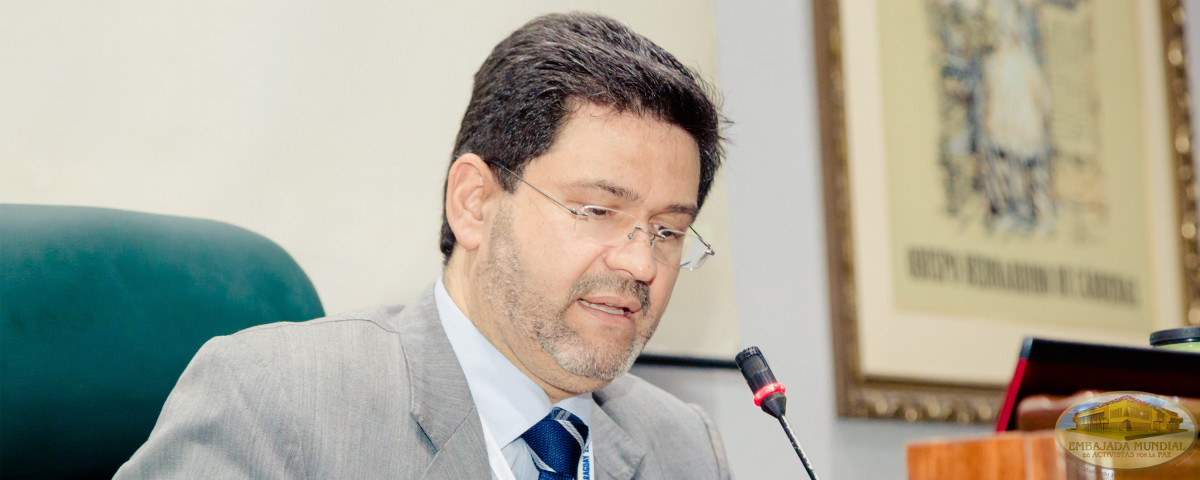
"The Parliamentary Diplomacy and its developments in international relations for Strengthening Peace and Sustainable Development " - Deputy José María Ibáñez
I know that we are against tim,e we started a little late, therefore, I am just going to leave some ideas about the title that I was assigned to present before you this morning: Parliamentary Diplomacy and its Progress in International Relations for the Strengthening of Peace and Sustainable Development; a rather broad, complex and long title. I would like is simply leave two or three ideas linked to this title, to this headline of what we have collected from the panelist colleagues' expositions to then move on to listen to some opinions, comments, and questions so that five minutes before 12 o'clock we can release everyone to go to lunch and fulfill with the established program in that way.
In Paraguay, parliamentary diplomacy does not have a very old tradition; it is a very recent practice that has had some important successes in the last years, and I want to mention some of the experiences that have been fundamental and key to sustaining democracy in our country. In 2012 when a political trial occurred within the framework of the constitution and laws of our country, a president was tried politically and was removed from his post and it produced a series of sanctions in the political sphere in its rights to Paraguay and as a member of Mercosur.
Parliamentary diplomacy has been key in seeking a new approach on the treatment that the regional community gives Paraguay in the sphere of Mercosur; in Mercosur there were very strong attitudes towards Paraguay and sanctions that have been very drastic in relation to what happened in 2012. However, and this same parliamentary diplomacy that has visited the governments of member countries of Mercosur, where there has not been much success in the change of vision because of a political ideological position issue of alignment to a hegemonic political line at that time. All were countries allied to the socialism of the 21st century; we do not make any value judgment, we simply say that was an allied government within a same ideological political scheme installed in the region.
However, there was much success in that same parliamentary diplomacy, and I mean lawmakers, senators, representatives, who went out to travel across various countries of Europe, they visited United States, Canada, Mexico; it has had great success in showing the other side of reality, and that is why Paraguay was able to successfully overcome all that time and, today, get to reestablish relationships within the framework of Mercosur within the absolute cordiality, the absolute peaceful coexistence within the scope of the dialogue. It was even the Republic of Paraguay, in the Paraguayan Parliament, here in this Parliament, where the legalization of the Venezuelan income was proposed to the Mercosur; such that the Parliamentary diplomacy works, has success, has successful experiences to connect, to generate confidence, to build bridges, to resolve conflicts, to destroy barriers, and also, of course, to install a debate, a discussion on the need for peace at a universal level, at the regional level, and local level.
Today, I really liked the term coined by Dr. Soto, of “locality”; I had never heard a term like this, so I think we are inventing a new term to include within the dictionary of the Real Spanish Academy; globality together with the locality, and peace has that dual characteristic, of having a natural globality, but also but also an origin, a base, and a local root, and all the citizens of the world, the citizens in our countries, men and women, we are challenged today by history, to preserve peace in our localities, in our neighborhoods, in our communities, and our countries, in our regions, and in the world.
That is the great challenge that I take with me, from the experiences, the exhibitions of such renowned panelists and world leaders that have brought their experiences today: The challenge is that there is less hunger in the world, that there is more security; from the local to the international and towards the global; that in our localities there is better education and there is better health, and there is less exclusion, and that there be more social inclusion. These are the basis for the construction of a local peace that translates into a global peace.
And I also take away, and that is going from the recorder to take note, that there has been a kind of self-criticism on everyone’s part, in terms of errors that we have committed throughout history, to the failures we have had throughout history, some as politicians, some as entrepreneurs, others as social leaders. We have failed in many things and that is why the world is as it is. But, the important thing is to remember that more than 2,000 years ago, there was a teacher, a great teacher, who did not come to judge us, or to condemn us; on the contrary, it was the society of his time who crucified him, but he died to give us hope. That hope that, today, we must share; that there is possibility of building a better world, that love can be at the center of our actions, of our programs, and that can allow us to build a society that lives in peace and that brings the peoples of the world together.
Thank you very much.